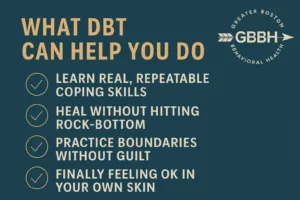There’s a version of burnout no one talks about. It doesn’t look like panic attacks or sobbing in the bathroom. It looks like emails answered on time. A packed schedule. Dinners prepped. Jokes told. Deadlines met. People impressed.
And behind it all—exhaustion that feels permanent.
If you’re the one people depend on, the one who keeps the group chat alive, the one who never lets anything drop—you might know exactly what kind of burnout this is.
At Greater Boston Behavioral Health, we work with people who don’t look like they’re struggling. Who show up, smile, succeed… and still feel like they’re breaking inside. People who are quietly using alcohol, food, work, or perfection to keep themselves from unraveling.
If that’s you, DBT therapy isn’t just another thing to fix. It’s the first place you get to stop.
When High-Functioning Stops Being Sustainable
You might not relate to crisis. But you do relate to pressure.
Pressure to always keep things moving. Pressure to stay calm. Pressure to make sure everyone else is okay—at the expense of your own nervous system.
For high-functioning people, the suffering looks subtle:
- Replaying every conversation after a social event
- Feeling edgy all day but calling it “productive”
- Drinking just enough to wind down—but never enough to call it a problem
- Saying, “I’m just tired,” when the truth is you haven’t felt like yourself in months
You don’t fall apart. You fade out.
It’s not always dramatic—but it’s still draining. And eventually, the tools stop working. You can’t outrun your own emptiness. You can’t out-achieve your own avoidance.
That’s when DBT becomes a lifeline.
What Is DBT—and Why Does It Matter for People Like You?
DBT (Dialectical Behavior Therapy) is a structured, evidence-based therapy originally created for people with intense emotions and self-harming behaviors. But here’s what most people don’t know:
DBT also saves high-functioning people who are silently drowning.
Here’s how DBT works at its core:
- Dialectics = Two things can be true at the same time. You can be successful and struggling. You can love people and feel angry. You can want to be better and still be tired of trying.
- Behavior Therapy = We don’t just talk about feelings—we teach real, repeatable skills to help you suffer less and live more intentionally.
The four pillars of DBT give you structure without shame:
- Mindfulness – Learning to stay grounded in the present
- Emotion Regulation – Managing mood swings and intense reactions
- Distress Tolerance – Handling emotional pain without self-sabotage
- Interpersonal Effectiveness – Setting boundaries, asking for needs, navigating conflict
If that sounds like a relief—it is. Especially if you’ve spent years pretending you don’t have needs, feelings, or limits.
DBT Isn’t About Falling Apart—It’s About Letting Go
One of the most common fears we hear from high-functioning clients is:
“What if I stop holding it together and everything breaks?”
The truth is, DBT doesn’t demand collapse. It invites honesty.
You don’t have to break down to get help. You don’t have to confess every detail of your coping to be taken seriously. You just have to be willing to say: “This isn’t working anymore.”
In a DBT group or one-on-one session, you can:
- Say what you actually feel—without a smile
- Learn how to feel discomfort without numbing it
- Practice boundaries that don’t burn bridges
- Hear someone say, “That makes sense,” and actually mean it
DBT doesn’t shame you for keeping it together. It helps you heal the parts of you that thought you had to.
What Healing Looks Like for High-Functioning Clients
Healing isn’t always a dramatic transformation. Sometimes, it’s incredibly quiet:
- Waking up and realizing you didn’t dread the day
- Drinking tea instead of wine after work—and feeling okay with that
- Saying “no” without spiraling
- Crying in therapy and then going to work without feeling like a mess
- Feeling bored, and realizing boredom isn’t danger—it’s rest
The people we see in our DBT program in Boston, MA often say the same thing after a few weeks:
“I didn’t know life could feel this quiet inside.”
That doesn’t mean your career stops mattering. Or your goals vanish. It means you don’t need the chaos to feel alive anymore. You don’t need the substances to get through a night. You don’t need to apologize for not being superhuman.
You Can Be High-Functioning and Still Need Help
There’s no gold star for suffering quietly.
There’s no trophy for being the one who never asks for anything. For pouring into everyone else and pretending it doesn’t cost you. For making emotional self-sacrifice look noble.
But here’s the truth:
- You’re allowed to want more than survival.
- You’re allowed to say “I’m done” before everything falls apart.
- You’re allowed to get support without proof of crisis.
If you’re looking for DBT in Boston, MA, or even just looking for a place where you can exhale without judgment—Greater Boston Behavioral Health is here. If you’re near Dedham, Waltham, Needham, or West Roxbury, Massachusetts, GBBH offers programs with that same approach.
FAQs: DBT for High-Functioning Professionals
I’m successful and doing “fine.” Do I really need DBT?
If you’re asking this question while privately feeling overwhelmed, emotionally numb, or burned out—DBT can help. You don’t need to be in crisis to benefit.
How is DBT different from other types of therapy?
DBT is structured, skills-based, and nonjudgmental. It’s especially effective for people with strong inner critics or people who intellectualize their emotions but still feel stuck.
Will I have to be in group therapy?
Not necessarily. Our DBT services include both individual and group options. Group work can be powerful—but it’s always tailored to your comfort and readiness.
Can I keep working while in DBT?
Absolutely. DBT is designed to integrate into real life—not take you out of it. Sessions are scheduled to support your work, school, or caregiving responsibilities.
Is DBT only for people with serious emotional issues?
No. DBT was created for intense emotional struggles, but it’s incredibly useful for high-functioning people managing hidden stress, anxiety, perfectionism, and burnout.
Still unsure?
Call (888) 450-3097 to learn more about our DBT services in Boston, Massachusetts. You don’t have to carry this alone anymore.


